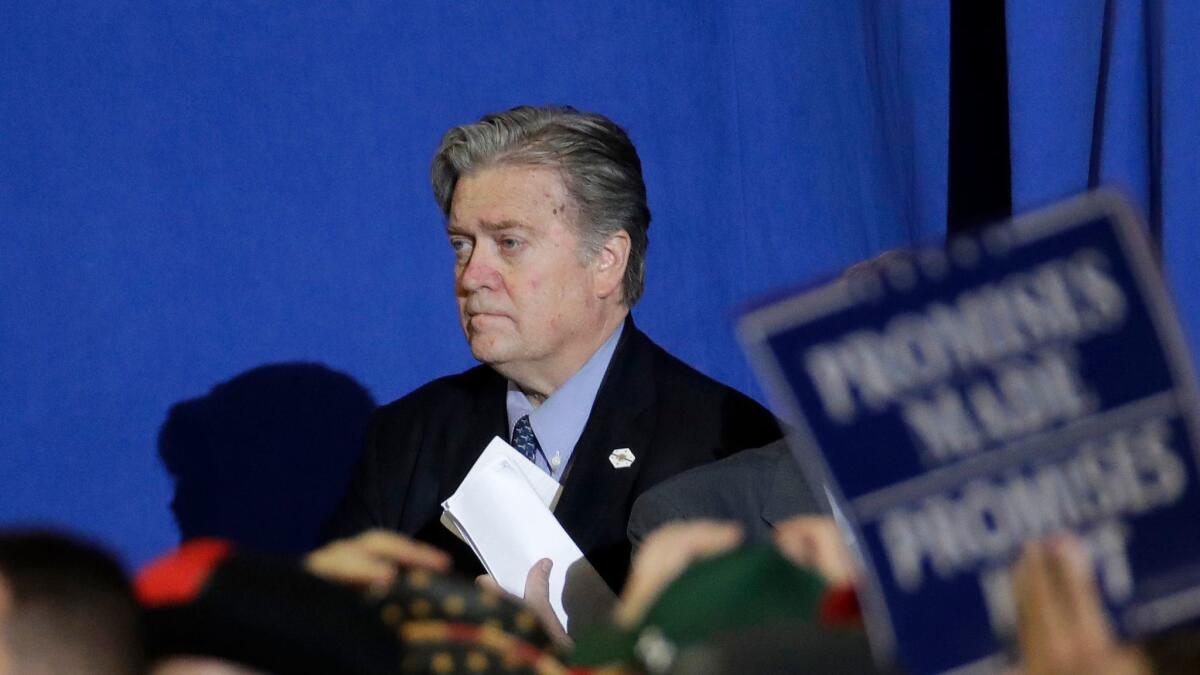Op-Ed: Stop using the term ‘populist’ for right-wing demagogues

- Share via
Horseshoe theory, or the idea that the far right and far left meet at the extreme ends of the political spectrum, is more in vogue than ever as pundits warn against the “populism” animating the alt-right and its close cousin, the dreaded alt-left. Tossed around in this way, the term “populism” flattens ideology and distracts attention from pressing political problems.
Dutch political scientist Cas Mudde, for example, recently argued that left and right populists have anti-elitism in common. As he wrote in Vice, “Populism is an ideology that considers society to be ultimately separated into two homogeneous and antagonistic groups: the ‘pure people’ and the ‘corrupt elite.’”
Granted, “populists of the left usually take a decidedly different approach, combining populism with some form of socialism.” A different approach, with the same overall goal? It’s unclear. He never establishes a common left-right political objective.
What Mudde and dozens of less-sophisticated talking heads ignore is that left populists like Ecuadorean President Rafael Correa and U.S. Sen. Bernie Sanders (I-Vt.) target actual elites — the wealthy. By contrast, right populists like President Trump and his chief strategist, Stephen Bannon, rail against a paranoid fantasy — a loose confederation of “globalist” donors, Black Lives Matter activists and Islamic terrorist sympathizers.
The problem with right-wing demagogues isn’t that they rail against the elite; it’s that they rail against a fake one composed of vulnerable populations.
Without making this material distinction, without noting that the left’s version of the elite is largely grounded in reality while the right’s is not, those peddling populist think pieces commit intellectual malpractice. They make it seem as though the crisis of our time is anti-elitism. But it’s not.
Elites do, of course, exist. It is true that eight people on Earth have the same wealth as the bottom 4.5 billion. It is true that moneyed interests have a disproportionate influence on our body politic. It is true that one has to raise hundreds of millions of dollars — or be independently wealthy — to have a remote shot at winning the White House.
How best to combat (real) elite influence should be the political focus of the moment. Instead, pundits dismiss the idea of elites as such by trafficking in this silly, alt-center notion that the left and right are chasing equally fictitious boogeymen.
The temptation to create political categories that flatten right-versus-left disagreements extends beyond populism. Writers such as the Atlantic’s David Frum promulgate a slippery definition of “authoritarianism” that is somehow too narrow to include Frum’s former boss President George W. Bush, yet wide enough for South American leftists, Trump and the occasional unseemly nativist right-winger.
Frum put Venezuela and South Africa on his list of authoritarian countries, but he left off Saudi Arabia — which executes people for sorcery and doesn’t let women drive. He also ignored Israel, which occupies Palestinian land and gives Palestinian people few political rights.
“Authoritarian” and “populist” are both leveled arbitrarily against politicians a writer doesn’t like. Useful in theory, in practice these terms serve to indemnify more traditional power brokers.
Hence “populist” was used to smear Democratic presidential candidate Sanders as simply a variation of Trump, with countless writers lumping the two together using superficial similarities. Yet there were approximately zero comparisons between Trump and mainline Republican Sen. Marco Rubio, despite Sanders having virtually nothing in common ideologically with Trump, and Rubio backing Trump’s candidacy as well as the bulk of his policies.
Populism discourse all too often ignores worldview in favor of sales pitch, putting those who despise bankers on the same moral plane as those who despise (((bankers))). It prioritizes norms and style over substance and ideology, how one practices politics over why they do. As Baffler editor Brandy Jensen quipped on Twitter recently, “people who earnestly use ‘alt-left’ have the comprehension of my dog — she can parse tone but not content.”
The problem with right-wing demagogues isn’t that they rail against the elite; it’s that they rail against a fake one composed of vulnerable populations and shadowy puppet masters. Pundits should be targeting this specific right-wing current, not rushing to conflate it with the left-wing fight for a more just society.
Adam H. Johnson is a media analyst for Fairness and Accuracy in Reporting.
Follow the Opinion section on Twitter @latimesopinion or Facebook
More to Read
A cure for the common opinion
Get thought-provoking perspectives with our weekly newsletter.
You may occasionally receive promotional content from the Los Angeles Times.









